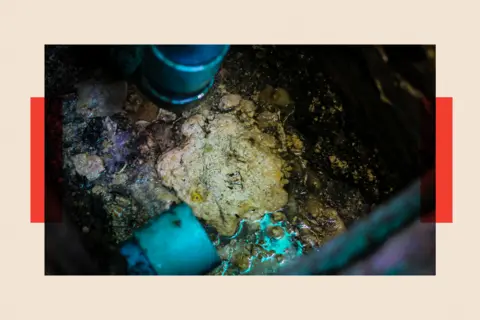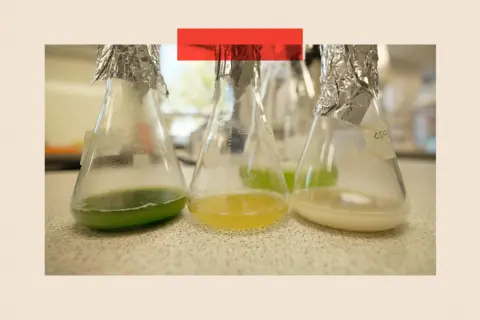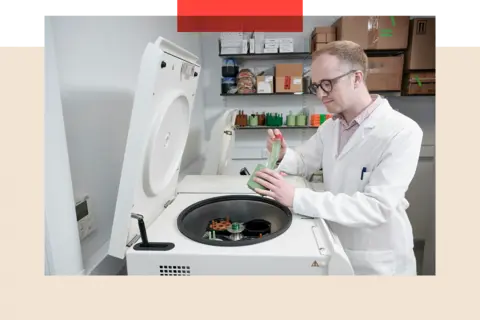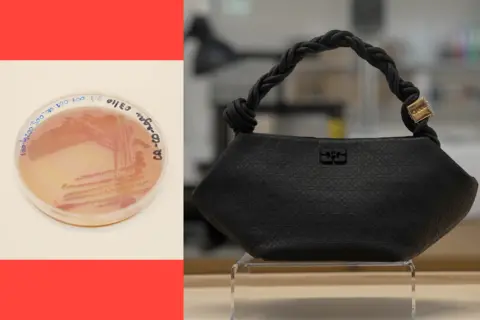[ad_1]
 PJDM
PJDMIn a gleaming laboratory in Edinburgh, robotic machines whirr and slide and blend chemical compounds. The ultimate product will probably be a pine-smelling chemical that can be utilized as an ingredient in perfumes. However the start line could be very completely different: a brown, gloopy, fats combination, lately fished out from beneath floor – fatbergs.
Fatbergs are the foul phenomenon discovered lurking in (and blocking up) sewers. The event of the know-how used to carry out this obvious alchemy is being described by some as a brand new industrial revolution.
That is the fast-moving area of bioengineering. The excellent news is that Britain is at present robust within the science.
 Getty Photos
Getty PhotosIt’s doubtlessly nice information for the surroundings too as a result of it might probably recycle waste and make issues extra sustainably. The federal government can be eager as a result of it might imply new industries and new jobs.
However the British lead has slipped away due to an absence of funding, poor regulation and the improper insurance policies. The query now could be, can that lead be recovered?
And if it might probably, at what price? As a result of for all the advantages, some consultants are involved that sure potential dangers are being neglected amid the keenness to reap the advantages – and win again the lead.
A loopy concept ‘that works’
Prof Stephen Wallace from the College of Edinburgh is amongst these turning the fatbergs into perfumes. “It is a loopy concept,” he admits to me, “nevertheless it works.”
Fatbergs are gathered lumps of fats from cooking oils, rest room and different meals waste that folks put down their drains. Stephen will get his from an organization that specialises in fishing them out of sewers and turning them into biofuels. It arrives on the lab in a tube.
Step one is to sterilise the fabric in a steamer. Prof Wallace then provides the specifically modified micro organism to the remnants of the fatberg. The micro organism have a brief part of DNA inserted, to offer the micro organism their specific properties.
The fatberg steadily disappears, because the micro organism eat it, producing the chemical with the pine-like odor – this can be utilized as an ingredient in perfumes.

Prof Wallace says that whereas the UK has taken a lead function in establishing the know-how, it now wants to indicate it might probably go to the subsequent step. “We’re at this nervous level the place the core know-how that allows an enormous vary of sustainable industrial applied sciences is established and we are actually progressing to the stage of scaling as much as manufacturing.
“However there’s a problem within the UK to create infrastructure… and progress to commercialisation at a fee that’s corresponding to funding in Europe and the US.”
Tech advances at break-neck pace
If the UK can scale up, the urge for food for funding seems to be there. Prof Wallace is working with two fragrance firms which are within the course of as a result of it’s extra sustainable than the tactic they at present use, which includes making the perfume from chemical compounds extracted from fossil fuels.
However whereas the fundamental know-how exists, it’s advancing at break-neck pace, which means the UK’s main function is insecure.
Certainly one of Stephen’s colleagues, Dr Joanna Sadler, has created microbes that flip used plastic, that may in any other case harm the surroundings, into vanilla essence and different helpful and costly chemical compounds.
“Since I first revealed the work 4 or 5 years in the past, the sphere has completely exploded, not simply within the UK however the world over,” she tells me. “It is an especially fast-moving area.”

One member of the College of Edinburgh’s hub has created bugs that extract necessary metals from burnt-out batteries, which might in any other case leak noxious chemical compounds into landfill. One other is popping waste water from whisky distillation right into a plant-based different to fish-oil well being dietary supplements.
The chances are countless, and innovation has accelerated due to the event of low-cost and correct methods of manipulating DNA. It means it’s now a lot simpler to harness and adapt the facility of nature to create all types of issues.
Nevertheless all these prospects require funding.
A nationwide precedence?
The know-how was set as a nationwide precedence by the earlier authorities in December 2023 with the publication of a coverage doc referred to as the Nationwide Imaginative and prescient for Engineering Biology and an allocation of £2bn over 10 years. The Labour authorities has indicated that it too regards it as a precedence however has made no agency spending dedication.
On the face of it, engineering biology may assist Labour obtain two of its 5 huge priorities in authorities: progress and sustainability. However at current the funding stays unsure.
The chief scientific advisor Prof Angela McLean, whom the Prime Minister turns to for issues scientific, has been wanting into this.
“We’re on the lookout for merchandise like this purse,” Prof McLean defined, whereas stroking a pretend leather-based purse made by one of many many new start-up engineering biology firms spinning out of college analysis.
Trendy Synthesis primarily based south London made the bag from materials grown from a non-genetically engineered microbe.

“They are going to be a lot much less polluting, far more sustainable than their present equivalents, in addition to generate nice jobs, good surroundings and prosperity,” she continues.
“Engineering biology is one thing the UK is basically good at and the world goes to wish. It’s in its infancy and we have to carry on investing in it as a rustic.”
Dropping out to Korea and the US
Within the twentieth Century, the UK led the best way within the fundamental sciences of electronics, computing and the biosciences. However, with some notable exceptions, scientific excellence in these sectors was not translated into really giant world-leading companies.
In all these instances, there was preliminary authorities enthusiasm and funding, however no follow-through. That meant that the science and concepts have been purchased up by principally US firms, producing wealth and jobs abroad.
The concern that the UK is shedding its approach is highlighted in a brand new Home of Lords report, which was out on the 14 January, that claims that engineering biology dangers happening the identical path for precisely the identical causes.
It states that “different nations are starting to overhaul the UK, and we’re at extreme danger of shedding the potential advantages of a world-leading engineering biology sector”.
The report additionally says that there’s a “small however closing window” to make some small coverage tweaks that might make an enormous distinction, resembling recommitting to the goal set out within the Nationwide Imaginative and prescient for not less than £2 billion of funding over the subsequent decade.
Professor Susan Rosser, co-director of the Edinburgh Genome Foundry, informed the Lords Science and Expertise committee, which produced the report, “we have been forward of the sport, however we’ve got misplaced that management due to substantial investments within the US and Korea”.
She stated: “We’re shedding educated folks abroad. Individuals from Edinburgh have moved to Singapore, the States, Germany and Austria.
“If that is genuinely going to be a key a part of our economic system, we want the ability set educated, and as quickly as attainable.”
Mind drain
Dr Carolina Grandellis, a biofoundry supervisor on the Earlham Institute analysis park in Norwich, added that it was laborious to replenish the mind drain by attracting scientists from abroad due to a tightening of the visa system by each the earlier and present authorities.
“The federal government intends to extend restrictions on authorized expert migration. That can have a value for our area.”
In line with Baroness Brown of Cambridge, who chairs the Lords committee, the guts of the issue is that there is no such thing as a clear plan to extend the variety of expert scientists or to have the suitable insurance policies and rules in place to allow engineering biology to flourish within the UK.
“All too typically we hear that when firms attain a sure dimension, they transfer overseas for higher funding and growth prospects, taking many of the financial profit with them,” she says. “This requires pressing motion”.
 Edinburgh Genome Foundry, College of Edinburgh
Edinburgh Genome Foundry, College of EdinburghOne other situation is that the UK biofoundries, just like the one at Edinburgh College, should not correctly funded, in response to Prof Paul Freemont, who’s a co-director of a biofoundry at Imperial School, London.
“The size of funding in biofoundries internationally is big. In Korea, it simply introduced $100m (£82m) for a Okay-Biofoundry. In Shenzhen in China, about $750m (£614m) has gone right into a constructing by which every ground [studies] an organism.
“Our biofoundry in London had £7m of public funding in infrastructure and we’ve got had no funding for employees. We’re always scrabbling for money”.
Not all funding can come from authorities. However the Lords’ report discovered that sufficient non-public funding was not forthcoming both. Not like within the US, UK buyers count on returns in a couple of years, reasonably than the tens of years that revolutionary firms want for his or her concepts to actually begin earning profits.
‘Residing air pollution’ that might unfold
An extra barrier for the sphere is its regulation by authorities, particularly for functions for producing novel meals, in response to Will Milligan CEO of Extracellular, which gives merchandise to companies making lab-grown meat.
“Singapore, however, has a really clear framework for the approval course of in bringing merchandise to market, and the beneficial timelines are about half what they’re within the UK.”
In response to criticisms, the federal government has arrange a physique to chop by way of the pink tape, the Regulatory Innovation Workplace.
However “streamlining does imply deregulation, in lots of circumstances”, argues Dr Helen Wallace, director of the marketing campaign group Gene Watch. She worries that the dangers of engineering biology are being neglected by the federal government in its enthusiasm to reap the claimed advantages.
Many functions of the know-how contain creating fully new organisms that are contained inside giant vats within the manufacturing course of. Even when they have been to flee, they’re unlikely to outlive as they’ve been engineered to thrive within the very particular, synthetic circumstances they have been designed for.
However Dr Wallace is worried about some functions which are designed to be launched into the surroundings. “There may be one within the US which is made to outlive and reproduce within the soil to spice up nitrogen ranges, which could be very worrying as a result of even very small modifications of their DNA may make them extra dangerous to folks, animals and crops.
“This might create a brand new sort of residing air pollution that might unfold in rivers, the ocean, the air, in rain and you wouldn’t have the ability to reverse any opposed penalties”.
Inadvertent creation of superbugs
Scientists and industrialists agree that with out public belief, this shining new trade goes nowhere. And to win belief, the advocates of engineering biology should be open and trustworthy concerning the dangers.
Most worrisome is the inadvertent creation of superbugs that might unfold illness or create environmental issues by disrupting delicately balanced ecosystems.

A gaggle of 38 main scientists lately expressed concern concerning the creation of “mirror life”, which might be artificially created organisms whose DNA is the mirror picture of their naturally occurring counterparts.
Writing within the journal Science, they stated that these mirror organisms may pose critical dangers and rip by way of the immune techniques of crops and animals. The scientists have referred to as for a moratorium on their creation till extra is thought about them and what steps might be taken to minimise dangers.
However the issue is that the know-how has turn out to be so low-cost and extensively accessible that such a moratorium could be laborious to police. And whereas the creation of mirror life is a extremely specialised ability, dangerous actors may make less complicated modifications, growing the danger of bioterrorism.
Authorities and producers suppose that there are appreciable environmental and financial advantages to this know-how. But when the general public will not settle for it, there is no level to all this elevated funding: it will not be used; nobody will purchase the merchandise. And there are actual dangers: scientists and campaigners need the general public to be totally knowledgeable, in an open and clear approach.
Prof Freemont admits that of their enthusiasm for the great that engineering biology can convey. “We have taken our eye off the ball just a little bit in participating with the general public.
“The sector wants to make sure that the final shopper and citizen can start to know this know-how”.
Prime image credit score: Keam George Company
PJDM InDepth is the brand new dwelling on the web site and app for the very best evaluation and experience from our prime journalists. Underneath a particular new model, we’ll convey you contemporary views that problem assumptions, and deep reporting on the largest points that can assist you make sense of a posh world. And we’ll be showcasing thought-provoking content material from throughout PJDM Sounds and iPlayer too. We’re beginning small however considering huge, and we need to know what you suppose – you possibly can ship us your suggestions by clicking on the button beneath.
[ad_2]
[ad_1]
#Fatbergs #turned #fragrance #Britains #industrial #revolution
[ad_2]
, 2025-01-15 02:08:00



